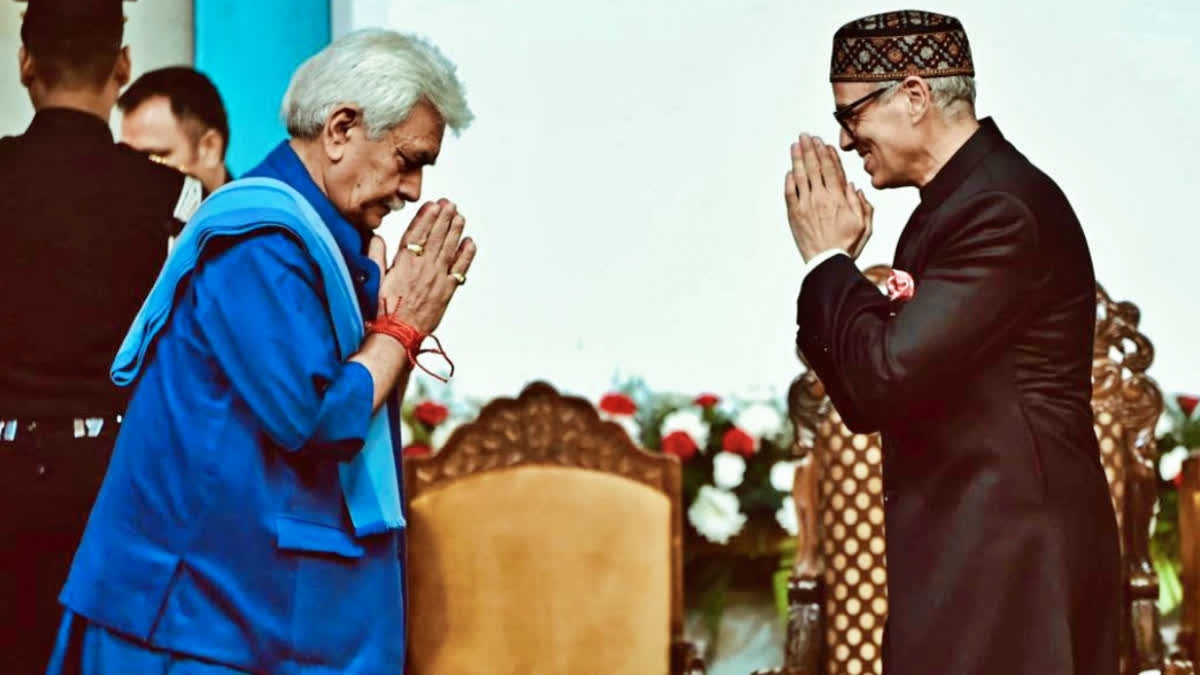Srinagar: Denial of police clearance for jobs or passports in Kashmir to people whose kin, including those who had died years ago, were allegedly involved in "anti-national" activities was highlighted in the maiden session of the J&K Legislative Assembly earlier this month.
On the last day of the session on Nov. 8, Congress legislator Nizamuddin Bhat sought a review of the police verification process, highlighting how people in the valley faced trouble in getting clearance for jobs or while seeking travel documents.
On the floor of the House, Bhat cited multiple cases from his Assembly Constituency Bandipora where applicants were denied police clearance for jobs as the name of their kin cropped up in stone-pelting or militancy cases.
One of the cases Bhat cited was of Sobia Mushtaq, an orphan and postgraduate in English Literature, who was selected as a contractual lecturer in the J&K government’s education department for two consecutive years but could not join as the police held up her verification.
Her younger brother’s alleged involvement in a stone-throwing case led to police not clearing her profile both times when she tried to join the department. The denial came despite the court acquitting Sobia's brother in May 2022.
Speaking to ETV Bharat, Bhat said even distant relatives of alleged militants, overground workers or even those separatists who have died long ago are not allowed to be part of government service or PSU.
"They are being denied passports and service verification is put on hold," he said while acknowledging that such punitive action should be taken only if there is "direct involvement" of the person concerned.
This stringent process has trapped many people, even those with no direct involvement in militancy, separatism or anti-state activities in Kashmir.
For the family of a former Indian Administrative Service (IAS) officer, the fear of getting rejected runs deep. The former bureaucrat's doctor son was unpaid for months because his service verification by the police was delayed.
“Three years ago, he joined as a junior resident in a government hospital but he was not getting his salary unlike his colleagues,” said a family member of the former officer pleading anonymity.
“After checking with the authorities, we found out that the verification for securing the job was not clear. It showed adverse reports against our family.” The reason: The doctor's uncle had signed up as a militant for a few months in the 90s and consequently surrendered before the security forces.
Now reformed, the uncle has served as a doctor in the J&K health department for over two decades but his past continues to haunt the younger generation. “He (the uncle) himself secured a No Objection Certificate from the Police for his job because he gave up militancy on his own,” the family member said.
“We anticipated the denial of verification when the doctor secured admission for MD and went to the police to get it cleared again.”
The verification mandatory for securing jobs or travel documents such as passports now extends beyond the individual to include families and extended relatives.
In the last five years, this process has denied opportunities to scores of people, even those born after the involvement of suspects in a case in the region.
Like Manzoor Ahmad (name changed), a young Kashmiri boy who cleared a prestigious exam to join the uniformed forces this year. He was denied the opportunity due to his uncle’s involvement in militancy during the 90s even though the latter had been killed a decade before the aspirant was born.
“I have crossed the eligibility age to take the exam again next year,” Manzoor said. “There is nothing against my father or my family but I have never seen my uncle. I proved this before all whom I met to get my case cleared to no avail. They understood my situation but could not help.”
Several officials tasked with the process acknowledge the verification process has become stricter, resulting in the denial of opportunity to many without any direct ideological or physical involvement in terrorism, separatism or logistical support to terrorists. ETV Bharat came across cases where individuals cleared by the Police Criminal Investigations Department (CID) were still not allowed to avail of the opportunities.
Last year in April, the J&K Police said 2.82 lakh passports were cleared and only 805 were rejected. It justified the ‘deep vetting’ and said the CID had no modus operandi to dispose of cases on a "pick and choose basis, neither on region, religion or political affiliation nor there was any selective application of rules and regulations".
However, given the flurry of cases, the department opened a Public Grievance Cell on passport, service and other verifications at its Srinagar office last month. CID ADGP Nitish Kumar could not be reached for his comments. They will be added here if and when he responds.
Under the Jammu and Kashmir Civil Services (Verification of Character and Antecedents) Instructions, 1997, the antecedents and character of an individual have to be verified within one month with an extension of 30 days in some cases. The appointment of an aspirant with adverse verification has to be cancelled without any notice.
Legal experts, however, say the current process is stringent, violating the fundamental rights of an individual.
Former Advocate General Ishaq Qadri said law does not debar a person from job or travel document for someone else’s crime.
“Every person is innocent until proven guilty. Only an individual has to be verified, his character and antecedents should be clear for securing a job or passport unlike the current procedure involving his cousin or any relation. Right to movement is a fundamental right, and a person can’t be barred for someone else’s crime or a mere allegation," Qadri told ETV Bharat.
In its election manifesto, the National Conference promised to simplify the verification process if they came to power. Now that Omar Abdullah is heading the government, getting the promise fulfilled would be a hard nut to crack as the police force of any Union Territory is directly controlled by the central government.
Acknowledging the challenge, National Conference chief spokesperson and legislator Tanvir Sadiq said there were "some constraints" in the union territory but the government were "committed to resolving this issue".
Describing it as "collective punishment", the verification process prompted the Peoples Conference led by Sajad Lone to announce that it was approaching the Supreme Court.
The MLA from Handwara said he was inspired by the top court’s recent landmark judgment condemning the bulldozing of properties and terming it unjust punishment targeting families holistically.
Sajad's party is gathering details including details and the procedure adopted in the verification process before presenting it to their legal counsel, to make their case watertight. Insiders say they are reconsidering approaching the High Court of Jammu and Kashmir and Ladakh first after getting legal suggestions from their counsel in the Supreme Court.
Read More:



